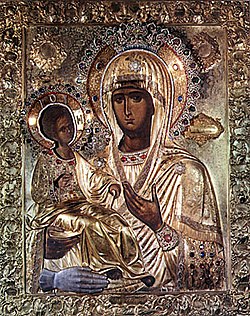Bogorodica Trojeručica (Serbian Cyrillic: Богородица Тројеручица, Greek: Παναγία Τριχερούσα, Panagia Tricherousa, meaning "Three-handed Theotokos") or simply Trojeručica (Тројеручица, Three-handed) is an Eastern Orthodox wonderworking icon believed to have been produced in the 8th century in Palestine by John of Damascus. It depicts Theotokos (Virgin Mary) with young Jesus in the hodegetria position, and is covered with a riza. On the back of the icon is the painting of St Nicholas.[1] It is today found in the Hilandar Monastery on Mount Athos, Greece, and is the most important icon of the Serbian Orthodox Church.[1]
| Trojeručica | |
|---|---|
 The "third" hand, made of argent, in the bottom left corner, original icon from the Hilandar Monastery | |
| Artist | St John Damascene |
| Type | Eastern Orthodox icon |
| Location | Hilandar |
History
editAccording to tradition, the icon was in the possession of John of Damascus in the early 8th century[2] and it is associated with his miraculous healing around the year 717. According to tradition, while he was serving as Vizier to caliph Al-Walid I, he was falsely accused of treachery and his hand was cut off.[2][3] The accusation was, allegedly, made by Byzantine Iconoclast emperor Leo the Isaurian, who was indeed a great opponent of St John, and friend of Al-Walid I.[2] Upon praying in front of an icon of the Theotokos, allegedly, his hand was miraculously restored. In thanksgiving, he had a silver replica of his hand fashioned and attached it to the icon.[2] After this, the icon became known as "three-handed" (Tricherousa), because it had three hands (two of the Theotokos plus one more).[2]
John Damascene became a monk at Mar Sabbas monastery outside of Jerusalem and gave the icon to the monastic community there. Later the icon was given as a present to St. Sava when he visited the monastery, together with another icon of the Theotokos in the style of Nursing Madonna, and with the crosier of Sabbas the Sanctified, the founder of the monastery.[2] Sava brought the icon to Hilandar monastery where he lived.[2] It remained there until 1347 when it was taken by Dušan of Serbia during his visit to Hilandar and brought with him to Serbia. At the end of the 14th century, the icon was in the possession of the Studenica monastery.[2] In the early 15th century, Trojeručica was back in Hilandar.
Until very recently the icon was formally the abbot of Hilandar, with monks elected to serve as its deputy.[2][4] This icon has two feast days: June 28 [O.S. July 11] and July 12 [O.S. July 25].
Art historians think the style of the icon is more likely from the 14th century, and that it may be a copy or re-painting of an earlier prototype.[5] Another version brought to Moscow in 1661 became famous, and resulted in many Russian copies.[6][7]
Gallery
edit-
Trojeručica copy, Troyan Monastery, Bulgaria
-
Trojeručica, Lesnovo monastery, North Macedonia
-
The third made copy of the original icon from the Hilandar, Grgeteg Monastery, Vojvodina province, Serbia
See also
editReferences
edit- ^ a b Serbian Orthodox Municipality of Innsbruck: ЧУДОТВОРНА ИКОНА БОГОРОДИЦА ТРОЈЕРУЧИЦА Archived 2009-05-11 at the Wayback Machine (in Serbian)
- ^ a b c d e f g h i "Ikona Presvete Bogorodice "Trojeručice"" [Icon of the Holy Theotokos "Trojeručica"]. Hilandar monastery official web site. Retrieved 8 January 2015.
- ^ Three Handed Virgin Icon at CatholicMax.com
- ^ Hilandar Research Library: "Hilandar 800&20" - Exhibit Catalog Archived 2011-04-10 at the Wayback Machine, 1998
- ^ Kesich, Veselin; Kesich, Lydia W. (1985). Treasures of the Holy Land: A Visit to the Places of Christian Origins. St. Vladimir's Seminary Press. p. 9780881410457. ISBN 9780881410457.
- ^ Ikon Copies: MOTHER OF GOD THREE HANDED Archived 2011-07-13 at the Wayback Machine
- ^ Slava Gallery, LLC: Online Catalog